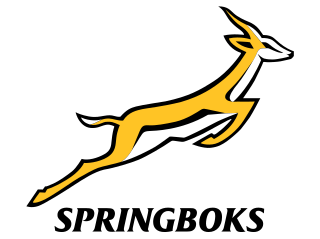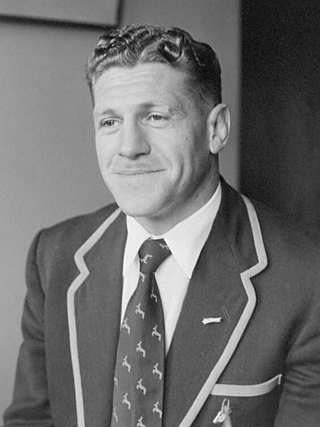
The New Zealand national rugby union team, commonly known as the All Blacks, represents New Zealand in men's international rugby union, which is considered the country's national sport. Famed for their international success, the All Blacks have often been regarded as one of the most successful sports teams in history.

The South Africa national rugby union team, commonly known as the Springboks, is the country's national team governed by the South African Rugby Union. The Springboks play in green and gold jerseys with white shorts, and their emblem is the Springbok, a native antelope and the national animal of South Africa. The team has represented South African Rugby Union in international rugby union since 30 July 1891, when they played their first test match against a British Isles touring team. Currently, the Springboks are the top-ranked rugby team in the world and reigning World Champions, having won the World Cup a record four times. South Africa have won half of the Rugby World Cups they have participated in and are also the second nation to win the World Cup consecutively.

The Australia men's national rugby union team, nicknamed the Wallabies, is the representative men's national team in the sport of rugby union for the nation of Australia. The team first played at Sydney in 1899, winning their first test match against the touring British Isles team.
The 1997 British Lions tour to South Africa was a series of matches played by the British Lions rugby union team in South Africa. This tour followed the Lions' 1993 tour to New Zealand and preceded their 2001 tour to Australia. The much-anticipated tour was the first after the end of apartheid in South Africa, and the first Lions tour since rugby union turned professional. It was only the third time that a touring side had won a test series in South Africa; the others being the 1974 Lions and the 1996 All Blacks.
William James McBride, CBE, better known as Willie John McBride is a former rugby union footballer who played as a lock for Ireland and the British and Irish Lions. He played 63 Tests for Ireland including eleven as captain, and toured with the Lions five times; a record that gave him 17 Lions Test caps. He also captained the most successful ever Lions side, which toured South Africa in 1974.

The 1937 South Africa tour to Australasia was one of the most successful Springbok tours in history, so much so that the touring team was nicknamed the "Invincibles". The squad was captained by Philip Nel.

Bryan Gary Habana OIS is a South African former professional rugby union player. Playing mainly as a wing, he is widely considered to be one of the greatest players in the history of the sport. He played for the Golden Lions, the Blue Bulls and Western Province in South Africa, for the Bulls and the Stormers in Super Rugby, and for Toulon in the French Top 14, and won 124 caps for the South Africa national team.

Jacobus Abraham du Rand was a former South African rugby union footballer. He played numerous times for South Africa, including on their 1951–52 Grand Slam tour of Europe, as well as captaining them once against the All Blacks.
The Cavaliers was an unofficial New Zealand rugby union team which toured South Africa in 1986. Because of the Apartheid policies of the South African government, the official New Zealand Rugby Union tour scheduled for 1985 was cancelled, and the Cavaliers tour was very controversial in New Zealand.
The 1981 Ireland rugby union tour of South Africa was a series of matches played by the Ireland national rugby union team in South Africa in the May and June of 1981. The Irish team played seven matches, of which they won three. They lost the Test Series 2–0 to the Springboks.
The 1994 South Africa rugby union tour of New Zealand was a series of rugby union matches played in New Zealand by the South Africa national team from June to August 1994. The team played 14 matches in total; 11 against provincial rugby teams and 3 against New Zealand. South Africa won 10 out of the 11 matches against provincial sides, losing to Otago. They lost their first two test matches against New Zealand national and drew the last test. The South Africa coach for the tour was Ian McIntosh. This was South African's first tour to New Zealand since the controversial 1981 South Africa rugby union tour, which was received negatively by New Zealanders due to South Africa's Apartheid regime at the time.

Stefanus Sebastian "Basie" Vivier was a South African rugby union player. He was capped for South Africa five times in 1956, though he was first selected to play for the Springboks on the 1951–52 South Africa rugby tour of Great Britain, Ireland and France; but was never selected for an international match on that tour. The touring team of 1951/52 is seen as one of the greatest South African teams, winning 30 of the 31 matches, including all five internationals.

Paul Geoffrey Allen Johnstone was a South African rugby union wing. Johnstone played club rugby in South Africa for Paarl, Hamiltons, Villagers, Pirates and Berea Rovers; and in the UK for Blackheath He played provincial rugby for both Natal and Western Province. He was capped for South Africa nine times between 1951 and 1956 first representing the team on the 1951–52 South Africa rugby tour of Great Britain, Ireland and France. The touring team is seen as one of the greatest South African teams, winning 30 of the 31 matches, including all five internationals.
The 1992 New Zealand tour rugby to Australia and South Africa was the 28th tour by the All Blacks to Australia, and their 6th tour to South Africa. It was first official visit by the New Zealand team to South Africa since the controversial tour of 1976.
The 1933 Australia rugby union tour of South Africa and Rhodesia was a series of 23 rugby union matches played by the Australia national team in 1933.
The 2013 Rugby Championship, known as The Castle Rugby Championship in South Africa, The Investec Rugby Championship in New Zealand, The Castrol Edge Rugby Championship in Australia and The Personal Rugby Championship in Argentina for sponsorship reasons, was the second edition of the expanded annual southern hemisphere championship consisting of Argentina, Australia, South Africa and New Zealand. New Zealand as the 2012 holders, was trying to keep their 100% winning record in the championship after winning six from six in 2012.
The 1960 New Zealand rugby union tour of South Africa, was a series of rugby union matches played by the New Zealand national rugby union team in South Africa and Rhodesia.
The 1965 South Africa rugby union tour of Australasia was a long series of matches played in 1965 by South Africa national rugby union team in Australia and New Zealand. It was not a successful tour. The Springboks lost both test matches against Australia and three of their four matches with All Blacks.
The History of the South Africa national rugby union team dates back to 1891, when the British Lions first toured South Africa where they played against South African representative sides. The South Africa national rugby union team played few international matches during a period of international sanctions due to apartheid. Since the end of apartheid in 1994, South Africa has once again fully participated in international rugby.







